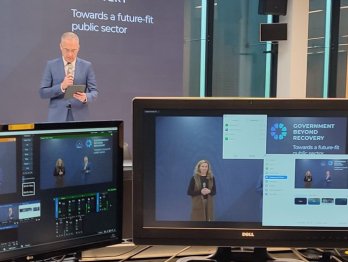Brazil Innovation Week: Building on the Country’s Innate Creativity

This blog was authored by guest blogger, Bruno Queiroz Cunha, Advisor, Special Advisory Unit for Management Modernization, Brazilian Ministry of Planning
Innovation requires a certain amount of creativity and dynamic thinking, two qualities that come somewhat naturally in Brazil. The country’s recent Innovation Week was all about harnessing these attributes for positive change in the public sector.

From November 30th and December 4th, several hundred participants embarked enthusiastically on a number of activities for Brazil’s public sector innovation week, Semana de Inovação em Gestão Pública. Held in the capital Brasília and organized by the Brazilian Ministry of Planning and the Federal Court of Accounts, in partnership with the OECD, the IDB and other national and international organizations, the Innovation Week has served as an extraordinary platform for putting discussions about public sector innovation squarely on the map in Brazil. The interest on the language of innovation was remarkable, and will have enduring effects in the country’s efforts to encourage more innovation in all levels of government.
The main purpose of the Innovation Week was to reflect on the upward international trend of innovation inside government in the context of Brazil’s reality and current needs in mind. To fulfil that purpose, the week was organized in such a way as to generate the necessary interaction and knowledge sharing that is fundamental for innovation in every area. During the initial two days, the focus was on StartupGov, a space for debate to get government experts closer to the startup ecosystem to promote networking, the discussion of ideas, and possibilities for future partnerships that address public interest issues. StartupGov is similar to endeavours undertaken in other countries, with the idea to facilitate cooperation between government and startup companies with a distinct civic spirit.
The central part of the Innovation Week was branded as an International Conference on Public Sector Innovation. Nearly one thousand people in total attended the two-day conference and had the chance to discuss with national and international experts on numerous topics pertaining to public sector innovation. Finally, on the fifth and last day of the Week, the Arena of Innovation was set up. Various courses and workshops were offered, ranging from training in innovation instruments to developing analytical skills.
The Innovation Week was also a great opportunity for national and international academics and practitioners to exchange ideas on how the public sector innovation discourse can speak to institutional, cultural and organizational elements in the Brazilian context. The broad international reach, with representatives from a dozen countries, has enabled a qualified comparative overview of several countries’ best practices. While public sector innovation has become a trendy topic, the fact that its tenets resonated positively with the large audience gathered in Brasília over those five days is significant.
Professor Wolfgang Drechsler from the Ragnar Nurkse School of Innovation and Governance at the Tallinn University of Technology delivered enlightening talks at the Innovation Week, and advanced one argument that may help to simplify potential debates linked to the international innovation bandwagon. According to Drechsler, there is nothing wrong with embracing what he called a “fashion” so long as it serves the right purpose, that is to provoke positive changes needed in government. This, however, should not amount to a carte blanche for jurisdictions to uncritically accept every new public administration trend or buzzword. The electorate will not fully legitimize even the most innovative government, if it fails to deliver basic public services effectively and meet citizens’ expectations. In other words, innovation should be seen as a vehicle for good government, and not an end in and of itself.
Indeed, many insightful views were put forward during the whole Innovation Week. Stéphane Vincent, co-founder and director of La 27e Région lab in France, underlined the importance of sharing knowledge and establishing a frank conversation not only about successes, but also about failures. For him, the latter is an area where governments and organizations around the world have been particularly timid. In the era of innovation in the public sector, failures are episodes from which incredibly relevant lessons can be derived.
Other experts’ critiques reflected on the importance of not losing sight of real-world constraints. A recurrent warning was related to the need for contextualising carefully what a public sector innovation narrative should look like in a developing nation context. Speakers have particularly emphasized that a country like Brazil should remain permeable to the international discourse, but simultaneously invest in adjusting new ideas to local conditions. Cibele Franzese from the School of Business Administration of Sao Paulo recalled in her speech that Brazil has a long list of incomplete public administration reforms, meaning that path dependence plays a major role in any attempt at transforming civil service structures and culture in the country. Fernando Abrucio, Professor at Fundação Getúlio Vargas (FGV), contended that innovative interventions always invoke choosing the targeted beneficiaries, which has to be taken seriously in order not to exacerbate inequalities and injustices within society.
Yet, a complementary perspective on the encounter between the new public sector innovation culture and the domestic landscape in Brazil seems to point to a mutually beneficial dialogue. At the same time, Brazil can take great advantage of the internalisation of cutting-edge experiences and tools in the field of innovation, and the country is also very well positioned to offer its own contribution to the international innovation discourse. Brazil has set forth over the last two decades to experiment successfully in various areas of policy.
There are many inspiring examples in the country where solutions have been developed in a dynamic and co-creative manner. Some of them have become well-known internationally, such as the case of Bolsa Família, a conditional cash transfer programme that uses different technologies. Additionally, the pioneering developments in participatory budgeting mechanisms in Brazil have spread around the world over the past number of years.
Other Brazilian innovations include less well known examples, such as the incredibly fast electronic voting and online income tax declaration systems, to recent evolutions in the speeding up of pension payments. Professor Antonio Isidro also presented interesting results from the work that has been carried out at the University of Brasília (UnB) analysing twenty years of public sector innovations documented by the Brazilian National School of Public Administration (Enap).
It is timely that Brazil is getting on board with the public sector innovation movement. The Innovation Week has served as a stepping-stone for various actions, but it was by itself just the first major project to be completed in the field in the country. The current strategy of the Brazilian government includes the design and implementation of several further actions and plans in this area.
One particularly promising project will lead to the setting up of a public sector innovation lab. Its operation will benefit from the cooperation between the Brazilian government and the Danish MindLab, which was formally signed between the two parties at the opening ceremony of the International Conference. Another crucial project is intended to provide structure for improved systematization and promotion of previous and ongoing cases of innovation in the country, which will help to disseminate and scale valuable experiences. For the latter, a fundamental inspiration is the OECD Observatory of Public Sector Innovation (OPSI).
Research and training institutions like Enap and the Brazilian Institute for Applied Economic Research (Ipea) have also subscribed to the same cause, and will soon be launching specific initiatives along similar lines. The cross-fertilization among these institutions and the central government’s innovation plans will be further complemented by actions that have been developed at the subnational level in Brazil, principally in the major states and capitals.
At a time of economic downturn in the country and extra strain on the government’s capacity to allocate resources and deliver public services, it is high time to act ever more innovatively. The Public Sector Innovation Week has had the outcome of highlighting the impressive number of civil servants as well as public-interest driven professionals from outside government keen to buy in on new ways of thinking about public governance and policy. If the main institutional and cultural components are handled correctly, public sector innovation initiatives are very likely to thrive in the country. In fact, several have already done so.






